- | 9:00 am
The inclusion of women in climate talks is critical, says H.E. Huda Al Hashimi
In a freewheeling interview, Huda Al Hashimi, Deputy Minister of Cabinet Affairs for Strategic Affairs in the UAE, talks about women's leadership, climate innovation, and what government can learn from startups.

There is a common misconception that the Middle East is full of archaic values and that women struggle to have their voices heard. The more female leaders we speak to, the more we’re convinced the contrary is true.
In fact, those in positions of power worldwide could learn important lessons from these strong women when tackling some of society’s most pressing issues, including the climate crisis, education, innovation, and entrepreneurship. And governance, of course.
“Any future created without contributions from all segments of society is not inclusive,” says Her Excellency Huda Al Hashimi, Deputy Minister of Cabinet Affairs for Strategic Affairs in the UAE, during a frank interview with the Fast Company Middle East. “It is a privilege to be part of an organization actively driving positive change.”
Locally and internationally representing the government in strategy, policy-making, and innovation, Al Hashimi is part of the change in a country advancing women’s empowerment and gender balance, bolstering female representation and rights with great success.
According to the World Economic Forum’s Global Gender Gap report, the UAE is the leading country when it comes to gender equality in the region. In the Federal National Council, 50% are women. Total parity has become mandatory following a 2018 presidential decree. The country also issued landmark decisions to advance equality in the workplace.
MEANINGFUL IMPACT
“As a member of the UAE Gender Balance Council, the commitment to gender equality is deeply embedded in the country’s history and culture,” she says.
The council’s initiatives, such as the Gender Balance Index and the Gender Balance Guidebook, highlight the country’s dedication to actively advancing gender equality and empowering women across industries.
It is not easy, and there has never been a linear upward path for female leaders.
According to her, female entrepreneurs and industry leaders must inspire the next generation of women to pursue their dreams and create meaningful impact.
And this can be achieved, she believes, by creating programs that highlight successful female entrepreneurs and government employees and provide visibility to their stories and achievements.
“We can also offer education and training, which are essential for building skills and knowledge that empower young women to pursue entrepreneurship or leadership roles,” she adds.
She lists creating programs and events, such as workshops and hackathons, to provide women opportunities to learn, network, and contribute to the future of governance.
WOMEN AND CLIMATE CHANGE
To her, UAE’s hosting of COP28 provides an opportunity to prioritize the inclusion of women in climate action and decision-making processes, hinting that the climate crisis cannot be ended without women’s empowerment as it is a complex issue that requires diverse perspectives and innovative solutions.
“Women, who are often disproportionately affected by the impacts of climate change, possess unique knowledge and experiences that are essential to effective mitigation and adaptation efforts,” Al Hashmi says.
“The inclusion of women in decision-making processes related to climate change is critical to ensure that policies and initiatives are developed with a full understanding of the needs and perspectives of all members of society.”
Al Hashimi, who also leads the Mohammed Bin Rashid Center for Government Innovation (MBRCGI), established to enrich the culture of innovation within the government sector, says that diversity is good for innovation. “And climate innovation is no exception.”
She says we “cannot afford to overlook the expertise and perspectives of women,” as it is only through a diverse range of voices that we can hope to address the climate crisis.
INNOVATION IN GOVERNMENT
In the past few years, the UAE has been an innovation powerhouse with dynamic companies scattered across the country. Dubai remains one of the world’s most innovative cities, with new businesses achieving unicorn status and research and education hubs.
To this end, the government is channeling public funds into R&D annually and has established new visa pathways for recruiting and maintaining talent.
Al Hashemi says continuous innovation is crucial for governments to adapt to a rapidly changing world and provide efficient services to citizens. “Innovation is often associated with the private sector, but it is quintessential in the public sector, too.”
According to her, a challenge in government, like in the private sector, is to find the right balance between the exploration of new approaches and the exploitation of proven ones. “This is particularly the case in the UAE context, where we have a strong emphasis on ideation, which is essential for generating new and creative solutions. Exploring what others have deemed impossible is part of our DNA.”
However, balancing the excitement with what is new with the importance of consolidating and building solid foundations is a must. “This is perhaps less glamorous work, but equally important for the public service, where implementation and delivery are what ultimately make a tangible difference for citizens.”
Agreeing that the future of innovation is collaborative, creative, and inclusive – crucially, partnering with private sector organizations to find innovative solutions for challenges in various local sectors – she says, “True innovation in governance requires drawing on the talent and competitiveness of private organizations.”
Citing examples of the government accelerators that serve as a platform for federal and local government entities, private sector organizations, academic institutions, and NGOs to collaborate and drive innovation, the minister says, “experimentation and innovation to bypass bureaucracy, foster agility, and enhance government human resources leadership capabilities” is imperative.
Furthermore, MBRCGI’s Pitch@Gov, held in cooperation with government entities, such as the Emirates Health Services and the Roads and Transportation Authority (RTA) in Dubai, brings together futurists, scientists, and experts to explore innovation in governance.
“The initiative helps startups transform their ideas into feasible solutions for future challenges in vital sectors, such as healthcare and transportation,” she says.
GENERATIVE AI IN GOVERNMENT
Now, with the arrival of generative AI tools such as ChatGPT driving a wave of demand for the technology and its use in government operations, Al Hashemi said it is crucial to explore its potential applications keeping in mind risks and drawbacks.
“As a government, we cannot afford to sit and wait – we need to quickly come to grasp both the positive and negative consequences of this new development.”
“Take, for example, the potential impact of generative AI on education. There is a debate around this issue currently, and it is important that we carefully navigate the fine line between promoting experimentation and innovation while ensuring that necessary safeguards are put in place to protect students and teachers. This is also a concern in the news and media industry, where we must ensure that generative AI is not used to proliferate misinformation.”
This year, the Edge of Government, the annual interactive exhibition at the World Government Summit, showcased a company that uses generative AI to translate citizens’ views and opinions on urban planning into visual images. This approach enables a more effective dialogue between citizens and city planners.
“We are currently exploring opportunities to test this concept in the UAE to gain a more granular understanding of the technology’s potential and limitations,” she says
Drawing an analogy, she says, like a startup, the government should focus on users’ needs and satisfaction. Governments can benefit greatly from studying and incorporating the principles of startup culture and user-centric design. “Fast-moving, opportunistic, and agile startups have a customer-focused approach that can help governments understand and prioritize the needs of citizens.”
She believes by adopting agile development methodologies and data-driven decision-making, governments can become more efficient in delivering policies and services that are user-friendly, accessible, and effective.
“However, it is important to keep in mind that the goals of a government are fundamentally different from those of a startup. While startups seek to deliver a product or service that meets the needs of a specific set of users in a competitive marketplace, the ultimate goal of the government is to serve the needs of all its citizens – not just a segment.”








































